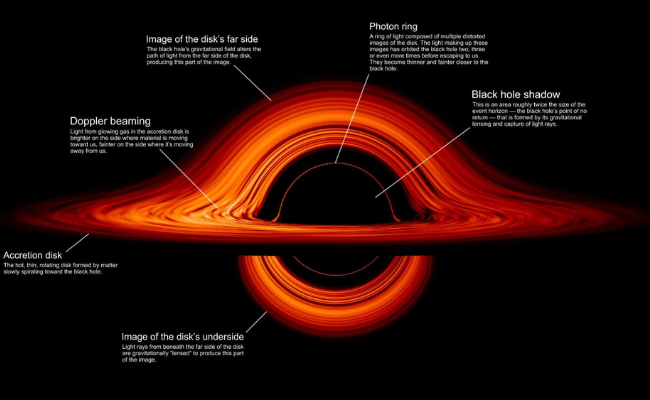Physicists Successfully Simulate a Black Hole in Lab, Then It Radiates Light
If you have ever wondered what a black hole looks like up close, some physicists have changed the narrative. In a bid to test the Stephen Hawking Theory, scientists were able to create a black hole in a lab, which started emitting light after a simulation of its event horizon.
A group of scientists created a simulation of a black hole in a laboratory while studying Hawking radiation properties. Although this is not the first incidence of a black hole simulated in a lab, a team of physicists led by Lotte Mertens of the University of Amsterdam in the Netherlands conducted this new experiment.
Black Hole in a Nutshell

Photo credit: NASA
A black hole is a region of space with a gravitational pull so strong that nothing, not even light, can escape from it. That region of space is referred to as the event horizon.
A black hole has three properties: mass, charge, and spin. Mass determines the strength of its gravitational pull. On the other hand, charge regulates its electromagnetic properties. And finally, spin controls the angular momentum.
The Hawking Radiation
In 1974, Stephen Hawking revolutionized our understanding of black holes. He suggested that the event horizon—the point of no return—can cause disruptions to quantum fluctuations, ultimately resulting in a peculiar form of radiation resembling thermal radiation.
You may also like: Stephen Hawking’s Black Hole Paradox May Finally Be Solved
However, if Hawking radiation truly exists, it is currently too weak for us to detect. Scientists may never be able to identify it amidst the background noise of the Universe.
Physicists Simulated a Black Hole in The Lab, And Then It Started to Glow https://t.co/0aB8UreSSN
— ScienceAlert (@ScienceAlert) April 6, 2023
Irrespective of this, scientists and physicists are pursuing new avenues of research. They’re looking at probing the properties of Hawking radiation and creating black hole analogs in a lab setting. This experiment isn’t new, but Lotte and his crew did something different this time.
The Experiment
Scientists constructed a one-dimensional chain of atoms to enable electrons to jump between positions. By doing so, they created an “event horizon” that obstructed the wave-like behavior of the electrons. This behavior caused certain properties to vanish.
This phenomenon generated a temperature increase consistent with theoretical predictions for black holes. However, this event only happened when part of the chain extended beyond the event horizon. It then mimicked a spacetime that appeared flat in specific simulations.
Implications of the Experiment
According to Science Alert, the evidence suggests that Hawking radiation’s thermal nature may be contingent on specific conditions. The event of gravity warping spacetime may also influence this nature.
The implications of this model for quantum gravity remain uncertain. Still, it provides a means of investigating the origins of Hawking radiation in a controlled setting without the chaotic influences of a black hole.
You may also like: Taste the Metaverse – Yes, You Read That Right!
The researchers added that the simplicity of the simulated black hole makes it a versatile tool in various experimental settings. “This can open a venue for exploring fundamental quantum-mechanical aspects alongside gravity and curved spacetimes in various condensed matter settings,” the researchers wrote.
Conclusion
The successful simulation of a black hole in a laboratory setting is a remarkable achievement that opens up new avenues for exploring the properties and behavior of these enigmatic objects.
The emergence of Hawking radiation from the simulated black hole is a significant step forward in our understanding of black holes and their role in the universe. We can look forward to many exciting developments in the years to come.

